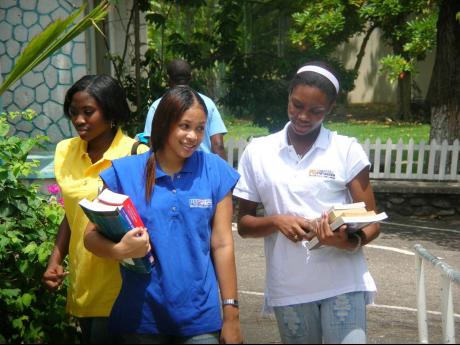Pre-University School – increasing access to tertiary education
In September 1999, an idea was brought to life by Dr Ronald Robinson that would transform university access in Jamaica, increasing the speed at which high-school students matriculated and improving the numbers of those who qualified for entry.
That idea was the Pre-University School, which started with just 121 students doing GCE Advanced and O’ Level subjects in just one year, and to achieve this, he partnered with fellow Taylor Hall Alumnas Dr Charlton Collie to realise the dream.
The objective was to create an enabling environment where instead of the traditional two-year sixth-form model, students would be introduced to an accelerated programme in which they could complete the GCE A’ Levels, now CAPE (Caribbean Advanced Proficiency Education (CAPE) courses, in under one year in order to matriculate to university. A halfway house of sorts, half-university environment and half-high school, where students were relied on to show initiative and drive in establishing their own timetables, which comprised mostly lectures with lots of discussion to strengthen academic confidence, subject choices, and class schedules.
The school was designed from the ground up to cater to the many students with good grades that for whatever reason did not gain acceptance to the sixth-form programmes in the traditional high schools.
STUDENTS WITH POTENTIAL
“The Pre-University School also challenged the long standing status quo, of discarding students with four or five passes, who were seen as borderline but who we knew had the potential,” Robinson noted.
He observed that the formal educational system had created a niche market by not catering to the needs of a host of students with ability, and that presented him with both a business opportunity and a chance to serve.
“We decided that the best model would be to create a compressed programme, which today lasts from September to May,, to complete the two units of CAPE. We prepare them for the self-discipline of university by acclimatising them to larger class sizes. Our average pass rate is now at 89 per cent, and we are among the top institutions matriculating students into UWI (The University of the West Indies)and UTech (The University of Technology), with a cohort of 500 students sitting CAPE and CSEC (Caribbean Secondary Education Certificate) subjects yearly, compared to an average of about 50 to 60 students in upper sixth in the traditional schools,” Robinson said.
The School is currently the only secondary institution in Jamaica to offer an advanced placement option, where students with at least five CSECs, or its equivalent, can earn three credits towards courses at The UWI in the faculties of the Humanities and Education, Engineering, and Social Sciences.
The Pre-University School has a conducive learning environment.
“We have access to the best lecture rooms and laboratories at the tertiary level. The school has benefited tremendously from having access to a pool of highly educated tutors with MScs and PhDs,” Robinson said, adding that “there should be no question that a student should ask that a tutor should not be able to answer”. “Twenty years later, we can surely say that the project called Pre-University has worked,” he noted.

